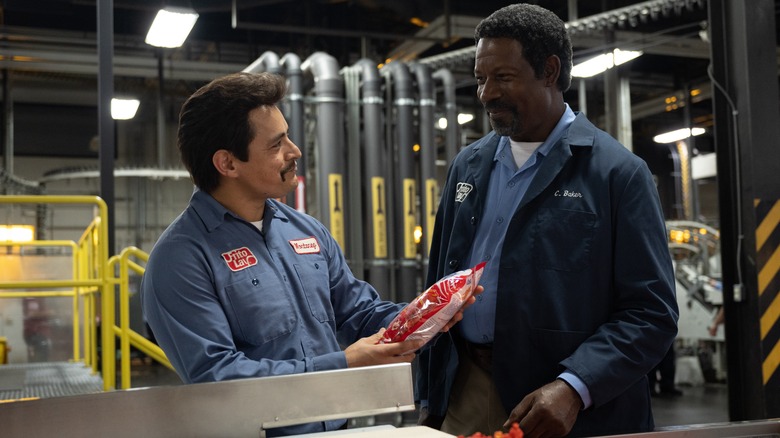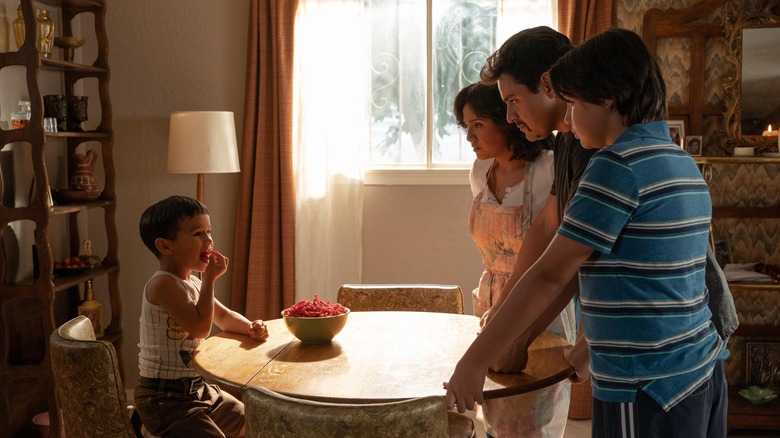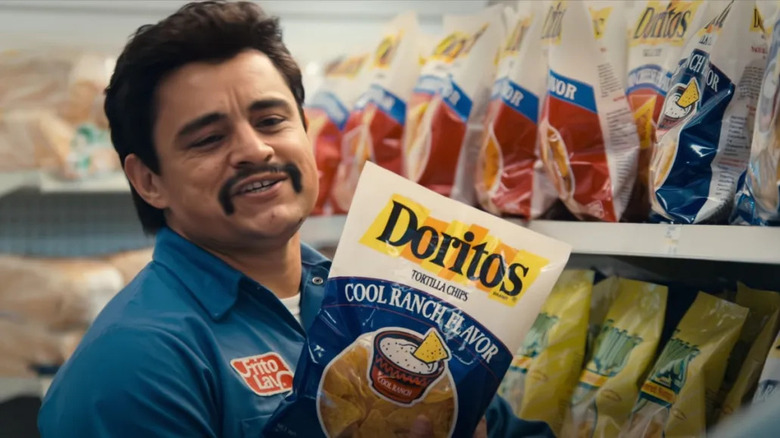Flamin' Hot Review: An Entertaining Adaptation Of A Flamin' Lie
- An entertaining biopic, in no small part due to Jesse Garcia's charismatic lead performance.
- The movie deviates from real events so much, it's hard to view it as anything more than a commercial.
- And when viewed in this light, it's hard to view its inspirational message with anything more than cynicism. Watch with your brain turned off, however, and you'll have fun.
So far, 2023 is shaping up to be the year that the movies try to convince us that gigantic corporations are the underdogs. Less than halfway in, and we've already had faux-inspirational tales about how Nike came out on top in the basketball sneakers war (via Ben Affleck's latest directorial effort "Air") and an offbeat espionage tale about Nintendo getting the rights to Tetris (in, you guessed it, "Tetris"). Not every film in this vein is championing its boardroom protagonists –- the critically lauded "Blackberry" deals with the fall of the Canadian smartphone giant rather than the rise –- but that has proved to be the exception rather than the rule.
"Flamin' Hot," the directorial debut of actress Eva Longoria, is awkwardly pitched somewhere in the middle. It is a classic rags-to-riches story, charting a janitor's decade-long rise to become one of Frito-Lay's marketing masterminds, developing the idea of Flamin' Hot Cheetos and transforming them into a ubiquitous powerhouse brand.
Not quite an inspirational story
"Flamin' Hot" is a film that at times seems overly concerned with not appearing to be a feature-length commercial or simplistic inspirational tale, aiming to criticize the economic policies of Ronald Reagan and the widespread prejudice against Mexicans both inside the workplace and out, to chart how the Montañez family was left struggling for several years, despite being in full-time employment. It's a commendable effort, but one that feels a bit hollow when this should-be inspiring message suggests that the only solution for a life of poverty is coining a once-in-a-generation idea. The very nature of this story means it can't escape the accusations of being nothing more than an advert for the company, something which only intensifies when the movie is placed in comparison with how these events really went down -– more on that later.
It's hard to overlook this, which is a shame, considering just how infectiously likeable Richard Montañez (Jesse Garcia) is as a protagonist. We're introduced to him back at elementary school in the 1960s, where he's routinely the target of racist bullying, in large part due to the traditional dishes his mom makes him for his lunch. One day, she makes him an extra burrito to give to his main bully, who falls in love with it immediately. It's the first taste of a moral about breaking down cultural barriers via the power of food, the very mission which propels him to success a few decades later.
We zip through the first decades of his life –- escaping a life of crime, marrying and starting a family with his longtime girlfriend Judy (Annie Gonzalez) — to land in the backrooms of Frito-Lay's Rancho Cucamonga factory. It's here that we see years of financial strife catch up with the family, who are still struggling to pay the bills despite both being employed, leading Richard to start "thinking like a CEO," with the aim of learning enough tricks of the trade to get a promotion. He hits a wall, however, due to significant budget cuts; dozens lose their jobs, and suddenly, Richard develops an idea that he hopes will boost Frito-Lay's revenue by entering into a Hispanic market he believes are crying out for spicier tastes than what's on offer.
What isn't mentioned in Lewis Colick and Linda Yvette Chávez's screenplay, adapted from Montañez's memoir "A Boy, a Burrito and a Cookie: From Janitor to Executive," is that a considerable amount of the facts stated here have long been contested. An L.A .Times report from 2021 concluded that his account of the story was factually inaccurate; sources within the company claimed he didn't develop the revolutionary product, although his work for Frito-Lay was instrumental in expanding their Hispanic market share, and he did successfully pitch secondary products like Flamin' Hot popcorn. His inspirational story is, in the words of the snack food conglomerate, an "urban legend," one far likelier to grab attention than the true story of his still-impressive climb from factory worker to marketing executive. If anything, the fact he was able to spin this version of events and get both a publishing and movie deal off the back of it is testament to his marketing abilities.
Based on a true lie
Surprisingly, discovering this context after watching the film didn't make me sour on it as much as you might expect. It's a classic case of a director refusing to let the truth get in the way of a good story. And it is, undeniably, a good one, even if it acts as wish fulfilment; a man falsely reminiscing that he single-handedly saved the company, and thousands of jobs, even though he was just one small cog in a wider machine. The ethics of the real Richard Montañez doing this remain up for debate, but as a piece of cinematic storytelling, this doesn't feel particularly unusual next to any other boardroom biopic. This is a genre that can streamline several characters into a single surrogate, and switch around the dates of key events to push the story further forward –- you could argue that all Montañez did was give his story the Hollywood treatment in advance, fully aware that they would soon come knocking.
Even though the film remains entertaining when viewed in this light, this context does make it a far harder pill to swallow as a straightforward success story. After all, this makes it seem like more of an airbrushed commercial, reworking real events so they look like they're the product of one man, and not a wider team effort. If you weren't to read any more about Montañez after viewing, you'd probably find yourself charmed enough into buying a bag of Flamin' Hot Cheetos the next time you were at the grocery store.
As claimed in that L.A. Times article, the film's producers were aware of the tall-tale nature of this story, though that didn't stop them approaching the real man for a cameo at the end of the movie. It makes for an odd juxtaposition; a movie that now feels more like a direct commercial for Frito-Lay due to the artificial nature of the narrative, which has been disputed by Frito-Lay themselves. I imagine after seeing the movie, the company's executives won't be as concerned with a false version of events being peddled, as viewers will leave wanting to spend money on their snacks.
As much as I was entertained by the movie, it's hard to overlook it as anything more than a commercial. Whether that's for Frito-Lay, or for Montañez's own reputation after being openly criticized for stretching the truth, is up for audiences to decide.
"Flamin' Hot" premieres on Hulu on June 9.


